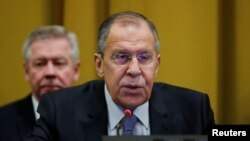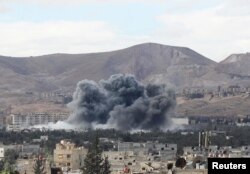Russian Foreign Minister Sergey Lavrov said Wednesday rebels in the eastern Ghouta area of Syria are blocking aid deliveries and preventing people from leaving during what Russia has called a daily "humanitarian pause" in its military operations.
The Russian plan is meant to give a five-hour window for people to get help or get out of the rebel-held area that pro-government forces have besieged since 2013.
Syrian state media also blamed opposition fighters for hindering evacuations for a second consecutive day. No civilians have yet left the area, which is home to about 400,000 people.
Rebels rejected the accusations during the first day of the limited truce on Tuesday, which included the two sides exchanging blame for continuing violence.
Mohammed Alloush, head of the largest insurgent group in eastern Ghouta, called for Russia to stop its aerial attacks on the rebels and honor a nationwide 30-day cease-fire resolution it voted for at the U.N. Security Council last week.
The Britain-based Syrian Observatory for Human Rights reported more fighting Wednesday in eastern Ghouta.
"There are some very bad actors involved on the ground, notably the Syrian government of Bashar al-Assad, but also a number of the rebel groups and others who have taken refuge within populated areas like the eastern Ghouta suburbs," said David Mack, a former ambassador and scholar at the Washington-based Middle East Institute.
Mack told VOA the Syrian government is taking advantage of the Russian plan in order to continue its efforts to oust opposition fighters from one of their last remaining strongholds.
United Nations officials have expressed concern about the humanitarian situation while insisting aid deliveries be allowed to reach those in need.
"The U.N. is ready to immediately support life-saving aid convoys and to support medical evacuations," the U.N. humanitarian office said Wednesday. "But the fighting must stop and approvals from all parties to deliver must be granted."
More than 550 civilians, almost a quarter of them children, have been killed in the last two weeks during the Russian and Syrian attacks on eastern Ghouta, one of the most violent episodes in Syria's seven-year civil war.
In Washington, a top U.S. commander, General Joe Votel, who heads the military's Central Command, accused Russia of playing an "incredibly destabilizing" role in Syria.
"Diplomatically and militarily, Moscow plays both arsonist and firefighter, fueling tensions among all parties in Syria," Votel told the House Armed Services Committee.
"Moscow continues to advocate for alternate diplomatic initiatives to Western-led political negotiations in Syria and Afghan-led peace processes in Afghanistan, attempting to thwart the U.N.'s role and limit the advance of American influence," Votel said.
Victor Beattie contributed to this report.






